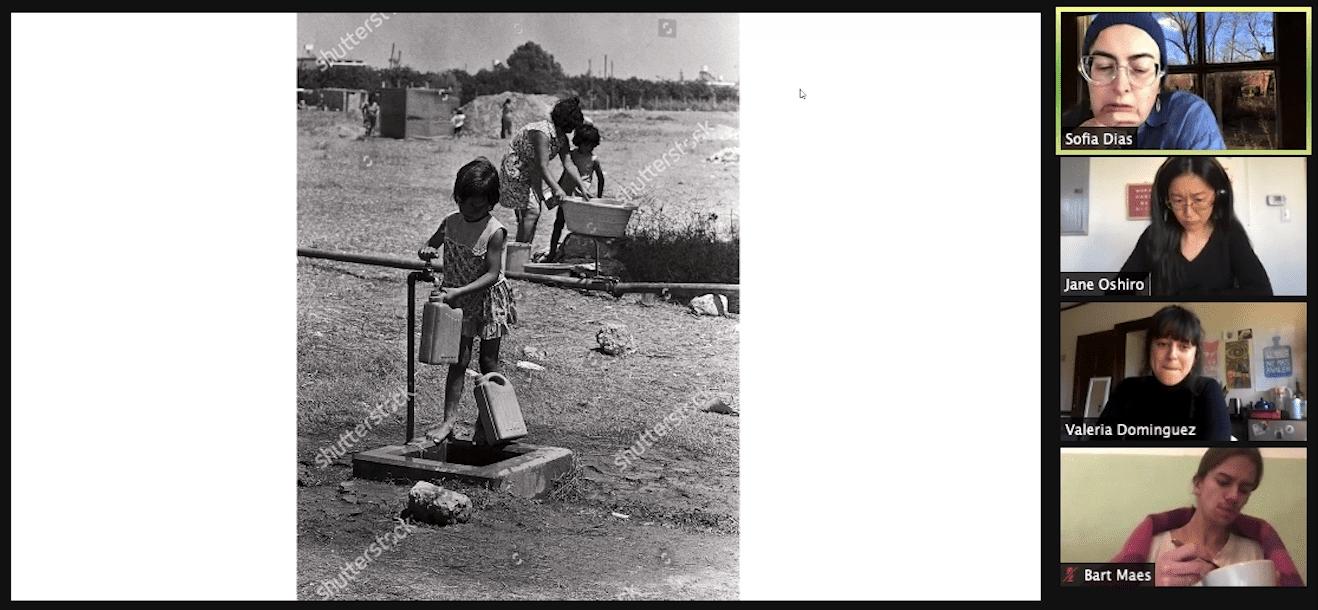By Jon Garaffa ’20
Sharing personal struggles and triumphs in unconventional ways, a digital theater experiment unfolded on Friday, March 26 as the finale to resilient-distant-creative, a Rapid Response Magic Project of the Princeton University Humanities Council. Supported by the David A. Gardner ’69 Magic Fund, Rapid Response Magic Grants bolster humanistic scholarship and community amid in-person gathering limits. The Rapid Response Magic Grant for resilient-distant-creative, an online performance and pedagogy initiative that inspects parallels between experiences of social distancing and migration, funded software expenses, undergraduate research assistance, and a workshop to train participants in the methods of digital theater.
Cosponsored by the Humanities Council and The University Center for Human Values, the comedy-drama ESL (English as a Second Language) depicts an online language class of seven people from different cultures. When a homework assignment becomes personal, the class bursts into an intense debate over the limits of language and storytelling. Throughout the play, each student explores how to best communicate his or her own experience of migration. During the process, the characters grapple with their identities and backgrounds, simultaneously seeking answers to challenging political questions of our day.
The ESL premiere, which presents the 24-minute play followed by a Q&A with the cast and crew, can be viewed in an hour-long video.
Argyro Nicolaou (Hellenic Studies) leads resilient-distant-creative and directs ESL, for which Besma Arnaout ’20 serves as producer and assistant director. Nicolaou, Arnaout, and Department of Spanish and Portuguese graduate student Oriele Benavides wrote the script with the cast. The cast consists of Nicolaou and Benavides, alongside Isabella Pu ’23, Ally Wonski ’22, Jhor van der Horst ’20, Megumi Watanabe (East Asian Studies), and local historian of Brazilian film Marcia de Castro Borges.
In the play, Wonski plays Katherine, an ESL instructor. With English levels varying immensely among her students, Katherine struggles to keep the class on topic and run sessions in a harmonious way. The students are Bart (portrayed by van der Horst), Chloe (Pu), Sofia (Borges), Jane (Watanabe), Eleni (Nicolaou), and Valeria (Benavides). Over the course of the class debate, each student naturally reveals his or her own experience, then confronts how to best impart that story to others.
After the screening, Arnaout led the Zoom Q&A where cast members spoke about how the project examines the art of storytelling, especially in disclosing one’s background and conveying feelings associated with one’s experiences of migration. For example, the character Eleni grows upset over her classmates’ ignorance of the history behind a photograph taken in her home country. She strives to somehow communicate her memories to people who have not undergone the same trials.
The project team also discussed how they crafted the characters. In the play, Nicolaou’s character Eleni has already written a doctoral dissertation in English, yet must still attend an ESL class to prove her English proficiency to her employer. Pu’s character Chloe, who lacks United States citizenship because she was born during a family vacation overseas, must take an ESL class to work at a summer camp despite already having English as her first language. Chloe and Eleni both lament being forced to take the class regardless of their fluency. These details poke fun at and highlight the dense bureaucracy of migrating to the United States, Nicolaou said.
The Q&A allowed the cast to share some of their own experiences. In the play, Watanabe’s character Jane feels eager to learn English grammar. In spite of the tension within the class, she often keeps her peers focused on the curriculum, reeling them back in from their heated debate. Commenting on the positive side of ESL classes, Watanabe mentioned how her enrollment in them helped her to build community with people in similar situations.
Some cast members’ uncomfortable recollections of arriving in a new country informed the script, Benavides said. Borges relayed the difficulty of integrating her reflections into the play while still meshing with the main message and ideas of the story. In collaborating on the script, cast members sought the best ways of incorporating one another’s experiences.
Moreover, preparing ESL helped the cast members in their journeys to better understand their own backgrounds. Pu mentioned how the months spent practicing for the performance encouraged her to delve into her own Chinese heritage, leading her to interview her parents, who both immigrated to the United States. In November, Pu described her recruitment efforts for the performance in a Princeton University Humanities Council podcast.
Importantly, the play’s themes of corporeality and movement manifested in its visual “stage,” according to van der Horst and Arnaout. The cast communicates with the audience through not only words but also bodily positioning in relation to the camera. Reflecting van der Horst’s passion for dance and the visual arts, which he studied at Princeton, his character Bart leaps and gestures throughout the production. The end credits show Bart dancing to acknowledge the physicality and closeness we long to reinstate when the pandemic subsides, Nicolaou explained.
Zoom features advance the plot. Characters begin in “breakout rooms” to discuss their homework assignment. They contact one another using chat and screen sharing functions. These unique methods of digital theater capture ways in which people now communicate from locations around the world.
Nicolaou pictured resilient-distant-creative as a means of experimenting with various online, collaborative approaches during social distancing. She expressed hope that ESL will aid artists and theater companies in exploring the digital resources available to them.
In closing, Nicolaou discussed the play’s potential to encourage ongoing discourse. “For me, there is something really powerful about this language class spinning into a discussion about these very big, personal, and political questions,” she said. “It does speak to the present moment in the sense that everything we do is so charged with bigger questions.”
















